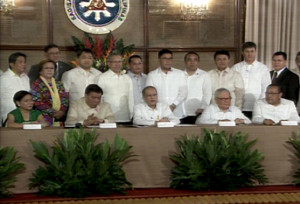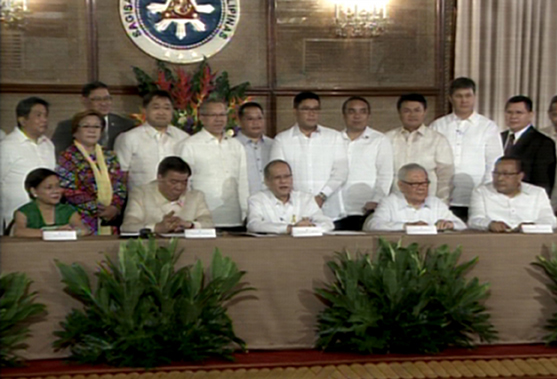
President Benigno Aquino III on July 21 signed two landmark legislation – the Foreign Ships Co-Loading Act and the Philippine Competition Act, the latter considered the longest-running measure in Congress, taking 25 years before hurdling the legislative mill.
Republic Act (RA) No. 10668 or “An Act Allowing Foreign Vessels to Transport and Co-Load Foreign Cargoes for Domestic Transshipment and For Other Purposes” allows foreign shipping lines to dock at multiple Philippine ports and co-load import and export cargos cleared by the Bureau of Customs.
RA 10667 (Philippine Competition Act), on the other hand, will level playing field for all businesses by penalizing anti-competitive agreements and abuses of dominant players. Under RA 10667, a Philippine Competition Commission will be established with the Chief Executive appointing a chairperson, four commissioners and an executive director.
Both bills were authored at the Senate by Paolo Benigno Aquino IV.
READ: Speech of President Benigno Aquino III during the signing of RAs 10667 and 10668
The younger Aquino said the Foreign Ships Co-Loading Act will reduce logistics costs for producers, create a more efficient import and export system, and lead to lower prices for consumers. It will also help decongest major ports in the country.
Under the legislation, a foreign vessel arriving from a foreign port will be allowed to carry loaded and empty foreign containers or bulk and breakbulk cargo to its domestic port of final destination after being cleared at its port of entry. These provisions also apply to loading of export cargoes.
RA 10668 effectively ensures the cabotage policy remains intact. The act noted that “no foreign vessel shall be allowed to carry any domestic cargo or domestic container van, whether loaded or empty, even if such van may contain foreign cargo.”
Under previous rules, a foreign shipping line will have to transfer its shipments to Philippine-registered carriers for final delivery to local ports to comply with the country’s cabotage policy. But in cases of a deficit in bottoms, the Maritime Industry Authority may issue a special permit to a foreign shipping line so it can deliver its cargo to domestic ports. In such a case, only the original foreign vessel and none other may bring the cargo to its final destination.
The co-loading act has gathered support from stakeholders such as the Philippine Inter-island Shipping Association (PISA).
However, PISA president Roberto Umali, in an earlier interview, said enforcement of the act is a concern since co-loading only applies to containers.
Umali said “by definition, co-loading only applies to containers” and “it will not apply to break bulk and bulk. It will be very difficult to monitor. It will not be easy to monitor a transhipment cargo from an actual importation cargo.” – Roumina Pablo





